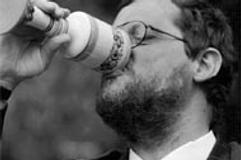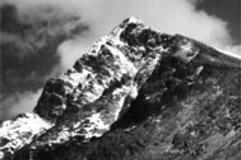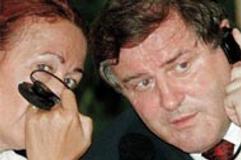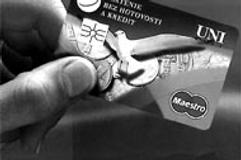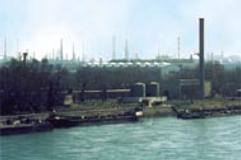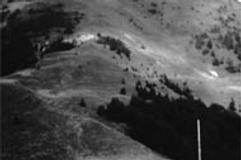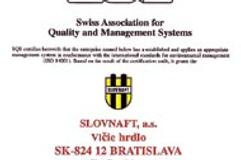Archive of articles - September 1997, page 2
If you desire to read an old article, use the search bar or select the publication date.
East-West gripped once again at Armwrestling Championships
Poprad biceps bulged in this mountain resort town Sept. 11-13, and some of the biggest bulges were Slovak. For three days, Poprad played host to the 7th European Armwrestling Championships, which brought together more than 260 competitors from 23 countries for the largest European championship ever held.An obvious East-West divide dominated the contest, as if the Cold War were still in full swing. The Russian team, sporting shirts that read "Armsport: European Championships" in Cyrillic characters, took home the lion's share of the prizes, winning twenty contests, but the home team placed a respectable third, ahead of Belarus but behind Georgia.Ján Germánus was the Slovak hero, powering his way to first place in the men's 85 kilogram right-handed category and second as a left-hander.
Slovaks say they are smear campaign victims
The Slovak foreign ministry on September 17 summoned the Hungarian ambassador to Slovakia, Jenő Boros, and handed him a protest note against what it called a concerted campaign to discredit Slovakia."The Slovak government is, with extraordinary indignation, recording a broad and intensive discrediting campaign unleashed against it by Hungarian political representatives," the note said, according to a ministry statement.Hungary rejected both the allegations of a smear campaign and the call to apologize. "We regard those conditionalities as totally lacking any foundation and Hungary does not feel it has to comply with those conditions," Hungarian foreign ministry spokesman Gábor Horváth said. Relations are strained to the point that the Slovak government cancelled a meeting between the Slovak and Hungarian foreign ministers, scheduled for the September 20-21 weekend.
Visegrád 3 not much better than Slovakia
Meeting last month in Krakow, the prime ministers of Poland, Hungary and the Czech Republic reaffirmed their desire to increase the level of cooperation between their three countries.Such sentiments have been expressed on numerous occasions over the past several years and skeptics may be right to question whether there is anything more persuasive about this latest declaration. But now, the official version has it, Central Europe' s keeners have a bigger, better reason for sticking together: the invitations they have received to begin membership negotiations with NATO, as well as an approval from Brussels for their applications to join the European Union.Even Czech Prime Minister Václav Klaus, notorious in the past for his dismissive attitude towards regional cooperation, had to concede in Krakow that there was now a genuine basis for it.
Kozlík paints rosy economic picture for year
Slovak Finance Minister Sergej Kozlík on September 17 painted a rosy picture of the country's economy, predicting further strong growth and a stable currency for at least the near-term, but some domestic and foreign economic analysts are not convinced.In a wide-ranging speech at the annual Finex banking and finance conference held in the central Slovak town of Banská Bystrica, Kozlík characterized the economy's development in the first half of 1997 as favorable, saying he saw no impediments to continued growth for the rest of the year."Our economy kept strong growth in the first half and we don't forecast any significant slowdown," Kozlík said referring to data released by the Slovak Statistical Office (ŠÚSR) on September 16 showing first half real GDP growth of six percent.
Kriváň: Mountain dear to Slovak hearts
Slovakia's 20 heller coin should bless its good luck. With so little to recommend it as real currency, it has (since 1993) been graced with the symbol of Slovak national consciousness - Mt. Kriváň. Granted, the imprint is unimpressive, resembling a hangnail rather than a mountain peak. But if you've ever been to the village of Podbanské in the West Tatras, you'll have seen Kriváň in the flesh and understood why it has cast such a powerful spell over generations of Slovaks.Podbanské is more a collection of cottages than a traditional Slovak village. It, like Kriváň, lies on the border between the High Tatra and West Tatra mountain chains, but unlike some of the better-known resort spots such as Štrbské Pleso, is never overrun with tourists at any time of the year. The local pub still sells cold draft beer for 12 Sk, and most cottages have neither telephone nor electricity.
Mečiar calls for ethnic minorities to be swapped between Slovakia, Hungary
Slovak Prime Minister Vladimír Mečiar's proposal to his Hungarian counterpart, Gyula Horn, at their August 15 summit in Györ to initiate a mass exchange of citizens has evoked sad memories about mass repatriation after World War II, provoked anger on both sides of the border, and appears badly timed as the European Union makes a final decision on Slovakia's application in December."I proposed that the free movement of people from the Slovak and Hungarian republics be established, including changes in citizenship," Mečiar told a crowd of his supporters at his party's regular monthly rally in Bratislava on September 4, "so that if Slovaks who live in Hungary want to live in Slovakia, the Hungarian government should commit to releasing them [from citizenship], and we will commit to accepting them [as our citizens]."
A card that is smarter than the rest of us
Those coins in your pocket, those bills in your wallet, look at them closely, feel them in your hand, because someday sooner than you think they will be collectors' items. That's due to the "smart card," a card the size of a credit card with a two-by-two millimeter computer chip on it able to record money amounts and process transactions."The future is so clear, it's obvious," said Dušan Budzák, the general director of LBS s.r.o., one of the companies marketing and promoting the smart card in Slovakia. "It will be common to put a set amount of money from your bank account on to a card, the so-called 'electronic purse,' with which you will be able to go to a store and pay for goods with it."An "electronic purse" is real money, not credit, drawn by a user on to their card from a bank or bank machine. The card can then be used in designated outlets with a scanner reading the chip and subtracting the amount from the electronic purse.
Public universities' creation fuels funding debate
Even as three new, government-funded Slovak universities open their doors to students from around the country this fall, the debate surrounding their creation is being played out between two main camps - those who claim that the decision to open the schools was apolitical and a response to genuine educational needs in the country, and those who argue that the law is part of a clandestine design to create a new pro-government university system and to let the old schools wither on the vine through lack of funds.The root of the issue lies in the Slovak Parliament's July 1 passage of a law calling for the establishment of three new centers of higher education: the University of Trenčín, Cyril and Methodius University in Trnava and the Academy of the Arts in Banská Bystrica, disbursing 290 million Sk for the project.
Chemical producers smell change
Most adult residents of Bratislava remember the 1980's as a time when air pollution lay over the city like a thick black mantle. In the eight years since communism, however, big polluters from the chemical industry like Slovnaft a.s. Bratislava and Istrochem a.s. Bratislava have reduced their most harmful emissions substantially.Still, much remains to be done, both to repair past environmental damage and improve current practices in order to meet the stiff European Union pollution standards that will come into effect in Slovakia on January 1, 1999. Much of the pressure to effect these changes, however, is being created by public awareness rather than government regulation.
Away from civilization in the remote Greater Fatras
Slovakia is remarkable, not least for the number of slang expressions that defy accurate translation. "Veľký frajer", for example, means something like, "Mr. Show-off," or "Mr. Know-it-all" or even "Mr. Smartypants." Anyway, this is the name I was given by my Slovak friends after I got us lost for the second time on a trip that I was leading, without the encumbrance of a map, in the Veľká Fatra mountains.The Veľká Fatra are among the wildest mountain ranges in Slovakia. Lying roughly between Banská Bystrica, Martin and Ružomberok, the chain supports a mixture of deciduous forests and grassy uplands, the highest peaks reaching almost 1,600 meters and most passes over 1,000 meters. With almost 60 kilometers of rugged trail separating the Horny Harmanec gateway in the South and the Ružomberok exit to the north, the Veľká Fatra are not for show-offs without accurate maps.
BCPB to introduce stock derivatives, options in 1Q98
The Slovak stock market showed signs of recovery during the last two weeks, primarily fuelled by the return of foreign investors to the market.We expect a temporary upswing of the Slovak stock market in the next few months as bargain hunters may be attracted by very low valuations. At the moment our universe of Slovak industrial stocks is trading at 1997 PER of 9.4 while Czech and Polish industrial stocks are almost twice as expensive.However, sustained growth of the market cannot be expected before the elections as foreign investors attribute a discount to Slovak equities such as weak protection of minority shareholders and weak legal enforcement, the market's opaque transparency and political uncertainty.
Slovnaft polishes image with certificate
At a press conference on September 8, 1997, petrochemical giant Slovnaft a.s. Bratislava announced that it had recently been awarded a prestigious international certificate, the ISO 14001, in recognition of its environmental management program.But before the love-in starts, say some environmental groups, people should be aware that the certificate may help chemical firms like Slovnaft 'greenwash' their image rather than eliminate polluting practices. The ISO 14001, they point out, certifies a company's environmental management system, and does not guarantee any specific emissions targets.Cestmir Hrdinka, Coordinator of Greenpeace's Toxic Campaign in the Czech Republic, suggested that Slovnaft's certification was not evidence of a superior environmental management system (EMS) but of a desire to improve its image as an exporter.
Around Slovakia
Police raid makers of false forintsNine people die in highway crashFive boys sentenced for killing homeless man
- Pastoral letter divides Slovaks
- News digest: Slovakia is being hurt by its failure to integrate foreign workers, says auditor
- Hollywood turns Slovak highlands into high-speed playground Video
- News digest: ‘Charlatans and quacks’: Pandemic investigator accuses scientists, pushes for jab ban Video
- Authoritarian echoes from Delhi to Bratislava
- Top 10 events in Bratislava for foreigners
- A café in an ice cellar, sand dunes and a flower shop at the border
- Slovakia brings back border checks with Hungary and Austria starting April 8
- News digest: ‘Charlatans and quacks’: Pandemic investigator accuses scientists, pushes for jab ban Video
- Pastoral letter divides Slovaks
- Bratislava opens new support centre for foreigners
- You say nazdar, I say dovi
- Top 10 events in Bratislava for foreigners
- Hollywood turns Slovak highlands into high-speed playground Video
- A café in an ice cellar, sand dunes and a flower shop at the border
- Neuroimmunologist Norbert Žilka: Slovakia in Alzheimer's research premier league
- Bratislava opens new support centre for foreigners
- Hollywood turns Slovak highlands into high-speed playground Video
- You say nazdar, I say dovi
- A café in an ice cellar, sand dunes and a flower shop at the border
- Top 10 events in Bratislava for foreigners
- Independent cultural space on Bratislava embankment to end soon
- Chicken Jockey! Chicken Jockey! Chicken Jockey! Video
- Záhorie uncovered: Slovakia’s quiet corner full of surprises Photo
- Last Week: And then they came for the NGOs
- What abides: Giving a shit
- Slovakia brings back border checks with Hungary and Austria starting April 8
- Bratislava opens new support centre for foreigners
- Hollywood turns Slovak highlands into high-speed playground Video
- Štítnik resumes hand-crafting Christmas ornaments after 25 years
- You say nazdar, I say dovi
- A café in an ice cellar, sand dunes and a flower shop at the border
- News digest: Slovakia is being hurt by its failure to integrate foreign workers, says auditor
- Forget the spa – Bojnice’s trails are the real therapy Photo
- Košice steelworks sinks deeper into the red
- A 'pink moon' will grace Slovak skies this Sunday
- Authoritarian echoes from Delhi to Bratislava
- Weekend: A sports event to get your running fix Photo
- Record-breaking Bratislava Marathon supports visually impaired athletes
- News digest: ‘Charlatans and quacks’: Pandemic investigator accuses scientists, pushes for jab ban Video More articles ›



